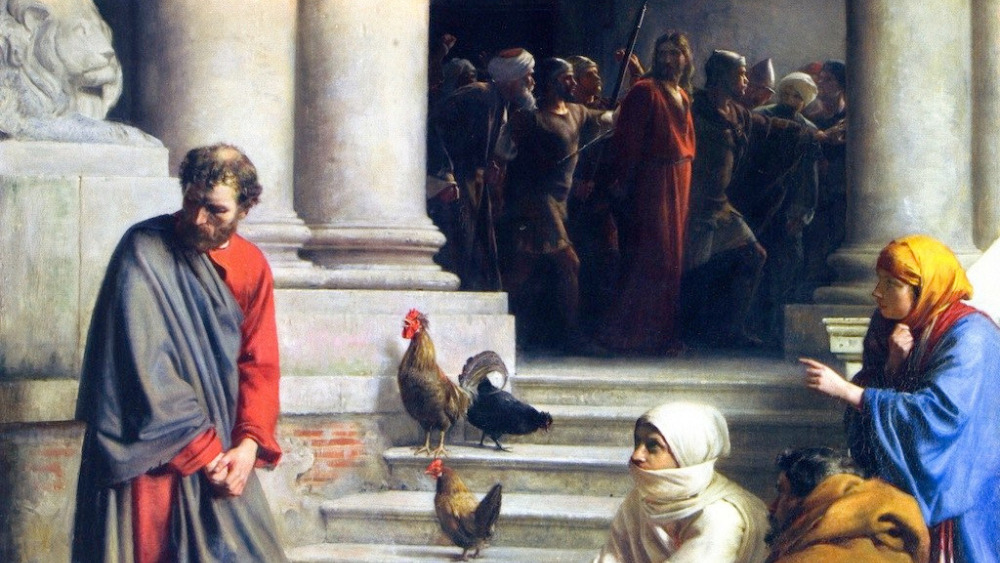Fight or flight. They’re the two choices we have when put under pressure. It’s a great and caring part of the way God made us. When we feel under attack and the adrenaline is pumping, we haven’t got time to weigh up pros and cons or do a cost-benefit analysis of various options. The brain overrides with two survival tactics. (Some people consider freeze a third instinctive response.)
In John 18-21, as Jesus and the disciples go into the night garden, Judas, his betrayer, comes with a mob “carrying torches, lanterns and weapons” (18:3). Under pressure, Peter fights. He draws his sword and strikes the high priest’s servant, cutting off his ear.
Later that night, under the pressure of questioning by others, Peter chooses flight, not fight, and denies Jesus three times. It’s a famous story of his undoing. Only hours before, he had zealously proclaimed to Jesus, “‘I will lay down my life for you.’ Then Jesus answered, ‘Will you really lay down your life for me? Very truly I tell you, before the rooster crows, you will disown me three times.’” (John 13:37-38).
Can you imagine the guilt and the shame when Peter denies Jesus the third time, and, “at that moment, a rooster began to crow”? (18:27) Under pressure, his courage comes undone. He lets down his Lord, and he lets himself down.
The Christian journey begins with bad news: “We have failed.”
Most of us have reasonable expectations of ourselves. We’re generally upright and decent. We live with integrity and want our words to be seen in action.
And so, we don’t like failing. We don’t want to let others down. It’s hard when we’re held to account. It’s confronting when others point out our blind spots, and challenging when others know we’ve made mistakes.
It’s very easy to rationalise bad behaviour or bad speech. It’s so tempting to cover it up so no one else knows.
The Christian journey begins with bad news: “We have failed.” To be brutally honest, this is the bad news of our daily lives. Each day, we wake up to a fresh start. Yet, it doesn’t take long before we’ve dropped our standards, missed the mark and let ourselves down. “For all have sinned and fall short of the glory of God.” (Romans 3:23)
Some days, it’s even in the form of denying the Lord Jesus. We want to be known as a disciple, following in his footsteps, but under pressure from a colleague, neighbour or friend – “You aren’t one of this man’s disciples too, are you?” – we can wilt and, like Peter, deny it.
It’s important to admit what we’re like, but the good news of the gospel is that we can fix our eyes on Jesus and see how he’s different.
The death of Jesus is the best news in the world.
Under pressure in that garden, Jesus is calm, confident and in control. He seeks to defuse the pressure and protect his friends. “If you’re looking for me, then let these men go.” (18:8). When the pressure bursts and Peter slices off an ear, “Jesus commanded Peter, ‘Put your sword away! Shall I not drink the cup the Father has given me?’” (18:11) How is Jesus so confident under pressure? How is Jesus so calm under pressure? He knows “all that was going to happen to him” (18:4) and what he has obediently chosen to do.
The cup is the cup of God’s wrath. It is the judgment our failures deserve. It is the separation between the eternal God the Father and his only begotten Son, as Jesus cries out on the cross, “My God! My God! Why have you forsaken me?”
And yet, knowing all this, Jesus chooses to obey. In humility, he allows himself to be bound and led away. He submits to unfair questioning, physical violence and mockery. He is stripped of his clothes and nailed to a cross.
And he dies. A public spectacle. A humiliating death. A miscarriage of justice.
Jesus is no more surprised by our failures than he is by Peter’s. But he’s done something about it.
But this is good news. This is the story that needs to be told and retold. The death of Jesus is the best news in the world. Why? Because Jesus died in our place. Jesus drank the cup that was reserved for me. Jesus faced God’s judgment so we won’t have to.
The bad news is we cannot live the life we want to. We let ourselves down. We let our Lord down, no matter how great our desire to lay down our lives for Jesus. He is no more surprised by our failures than he is by Peter’s. But he’s done something about it.
The good news is that Jesus willingly laid down his life for us. “I am the good shepherd. The good shepherd lays down his life for the sheep … No one takes it from me, but I lay it down of my own accord.” (10:11,18) Unlike a hired hand who cares nothing for the sheep, Jesus loves and cares for us. His death shows us the full extent of his love. “Having loved his own who were in the world, he loved them to the end.” (13:1)
This Easter is another opportunity to tell the good news to everyone and retell it to ourselves, for we all need to hear it. Under pressure. Knowing our failures. Aware of our mortality. Jesus alone did what we can’t do. He loved us and died for us. Thank you, Jesus.
Joshua Kuswadi is the Rector of St Peter’s Anglican Church, Nightcliff, Darwin.
Email This Story
Why not send this to a friend?


